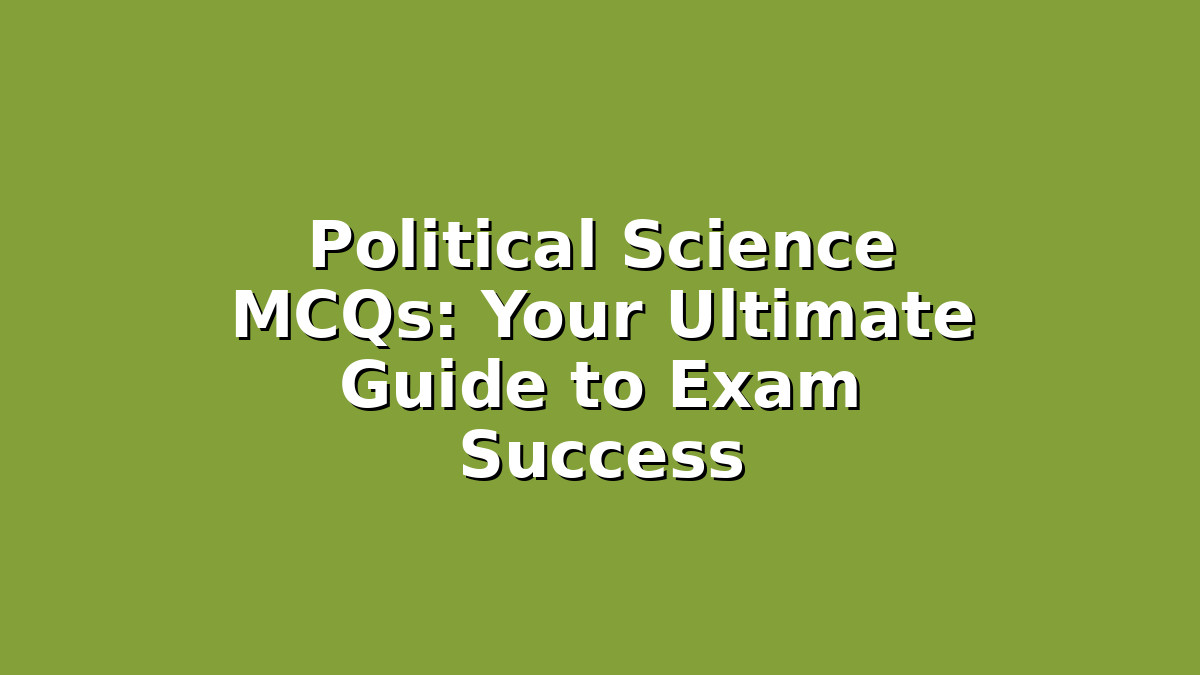Preparing for political science exams can feel overwhelming, especially when multiple-choice questions (MCQs) are involved. Whether you’re a high school student, an undergraduate, or preparing for competitive exams, mastering political science MCQs is essential for scoring well and gaining a deeper understanding of the subject. This guide will equip you with effective strategies to tackle political science MCQs confidently and efficiently.
Understanding the Importance of Political Science MCQs
Political science, as a subject, explores the theory and practice of politics, governance, and the functioning of political systems worldwide. MCQs are a common assessment tool because they test your knowledge across a broad range of topics quickly and objectively. Unlike essay questions, MCQs require quick thinking and a clear grasp of concepts, facts, and terminology.
For students, excelling in political science MCQs means not only memorizing facts but also understanding concepts, analyzing political scenarios, and applying theoretical knowledge. The good news is that with the right approach, you can improve your accuracy and speed dramatically.
Section 1: Master the Core Concepts and Syllabus
The foundation of success in political science MCQs lies in thorough knowledge of the syllabus and core concepts. The subject typically covers areas such as political theories, constitutions, governance structures, international relations, and political ideologies.
Tips for mastering the core content:
– Create a detailed syllabus checklist: Break down the syllabus into manageable topics and subtopics. For example, under political theory, include democracy, liberalism, Marxism, feminism, etc.
– Use concise notes and flashcards: Summarize concepts in your own words and use flashcards for definitions, key thinkers, dates, and landmark cases or events. This aids quick revision and helps reinforce memory.
– Focus on understanding, not just memorizing: Political science is about concepts and their applications. For instance, don’t just memorize the features of democracy; understand how democracy functions differently in various countries.
– Refer to multiple sources: Use your textbook, online resources, and current affairs materials. Political science is dynamic, and contemporary examples often appear in MCQs.
– Regular revision: Consistent revision is crucial. Spend at least 10-15 minutes daily reviewing important terms and concepts to keep them fresh in your mind.
By having a solid grasp of the fundamental topics, you’ll be equipped to answer questions accurately rather than guessing.
Section 2: Develop Effective MCQ Test-Taking Strategies
Knowing the content is half the battle; knowing how to approach MCQs strategically is equally important. Here are some proven strategies to enhance your performance:
– Read questions carefully: Understand what the question is asking before looking at the options. Political science questions may include qualifiers like “except,” “not,” or “most important,” which change the meaning significantly.
– Eliminate obviously wrong answers: Narrow down your choices by crossing out options that are clearly incorrect. This increases your odds if you need to guess.
– Look for keywords in options: Sometimes, certain words like “always,” “never,” or “only” can indicate an unlikely choice since political science frequently deals with exceptions and nuances.
– Be wary of absolute statements: Political science is rarely black or white; absolute terms often signal incorrect answers.
– Manage your time wisely: Don’t spend too long on a single question. If stuck, mark it and return later if time permits.
– Answer every question: Unless negative marking is involved, it’s better to guess than leave an answer blank.
– Practice with past papers and mock tests: Familiarize yourself with the exam pattern and question style. Time your practice sessions to simulate real exam conditions.
– Analyze your mistakes: Review the questions you got wrong to understand your weak areas and avoid repeating errors.
By combining these tactics with your knowledge, you’ll boost both your accuracy and confidence during exams.
Section 3: Leverage Technology and Group Study for Better Preparation
The digital age offers many tools and platforms to help students prepare for political science MCQs effectively. Additionally, studying in groups can enhance learning by exposing you to different perspectives.
Using technology:
– Online quizzes and apps: Websites and apps like Quizlet, Khan Academy, or specific political science quiz platforms offer thousands of MCQs with instant feedback.
– YouTube tutorials: Visual and engaging content can clarify complex political theories and historical events.
– Educational forums: Platforms like Reddit or Stack Exchange allow you to ask questions and discuss topics with peers and experts.
– Digital flashcards: Apps like Anki enable spaced repetition, a scientifically proven method to improve long-term retention.
– Current affairs apps: Staying updated on recent political developments worldwide can enrich your answers and prepare you for application-based questions.
The benefits of group study:
– Discuss and debate: Political science benefits from discussion. Debating topics like democracy or international relations with peers deepens your understanding and uncovers new insights.
– Quiz each other: Group members can create MCQs for each other, providing diverse question styles and increasing preparation breadth.
– Clarify doubts: Group members can explain concepts you find challenging, making learning more effective.
– Motivation and discipline: Studying with others can keep you motivated and accountable, preventing procrastination.
Combine these technological tools and collaborative methods for a well-rounded and engaging preparation experience.
Conclusion
Political science MCQs are an excellent way to assess your grasp of political concepts and current affairs. With a structured study plan focusing on mastering core concepts, employing smart test-taking strategies, and utilizing technology and group study, you can significantly enhance your preparation. Remember, consistency, practice, and a positive mindset are your best allies. Believe in your ability to learn and improve, and the exam results will reflect your hard work.
Stay curious, keep revising, and don’t hesitate to seek help when needed. Good luck with your political science exams – you’ve got this!

Responses